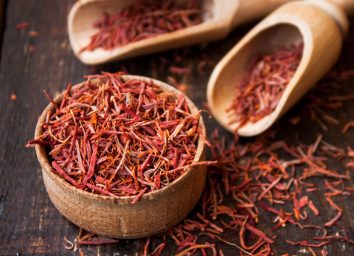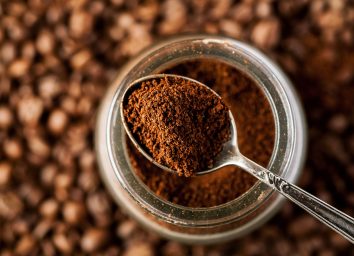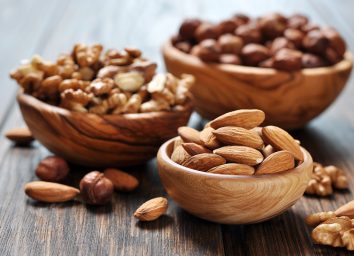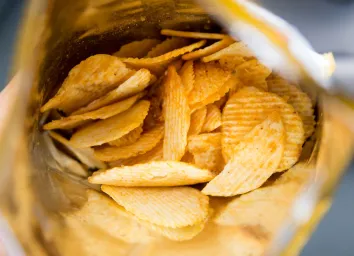17 Therapeutic Foods to Help Cope With Stress and Improve Your Mood
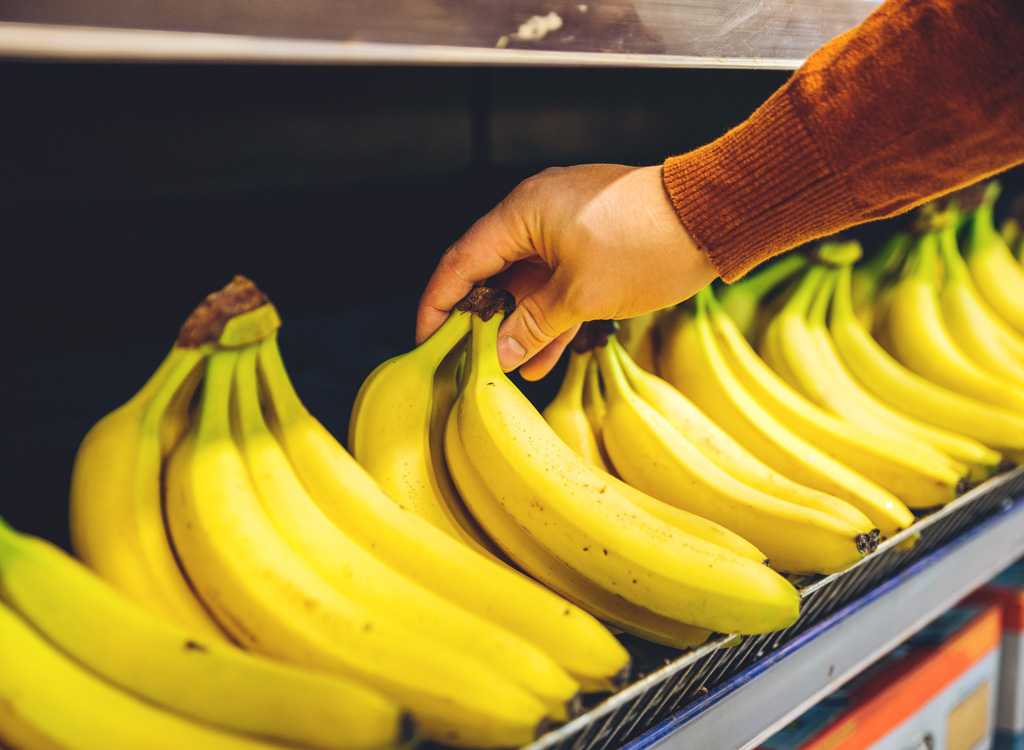
With all the daily stressors we experience in our lives, anxiety may seem like its lurking around every corner.
Anxiety disorders are serious diseases that are treatable by medical professionals. Anxiety is often characterized by extreme stress, constant worry, restlessness, panic attacks, and even obsessive-compulsive disorder.
You can also experience anxiety and stress in certain circumstances without being diagnosed with generalized anxiety disorder. And when anxiety rides high, you're at the mercy of stress hormones such as cortisol—known as "the belly fat hormone" for its ability to pull lipids from the bloodstream and store them in our fat cells. A recent Sleep Science review found that when stress prevents people from sleeping well, they are more likely to make bad food choices, snack late at night, and choose high-carb snacks.
If you believe you're suffering from an anxiety disorder, the first step you should take is contacting your medical professional. Medication is often prescribed as a treatment in most cases. For those who are experiencing general anxiety that comes occasionally with stressful deadlines, there are some dietary changes you can make to alleviate symptoms. These foods will help you relax, calm down, and refocus so that you can continue on with your day stress-free.
Here's a look at 17 foods that might just make you feel better—and your waistline will thank you, too.
Walnuts
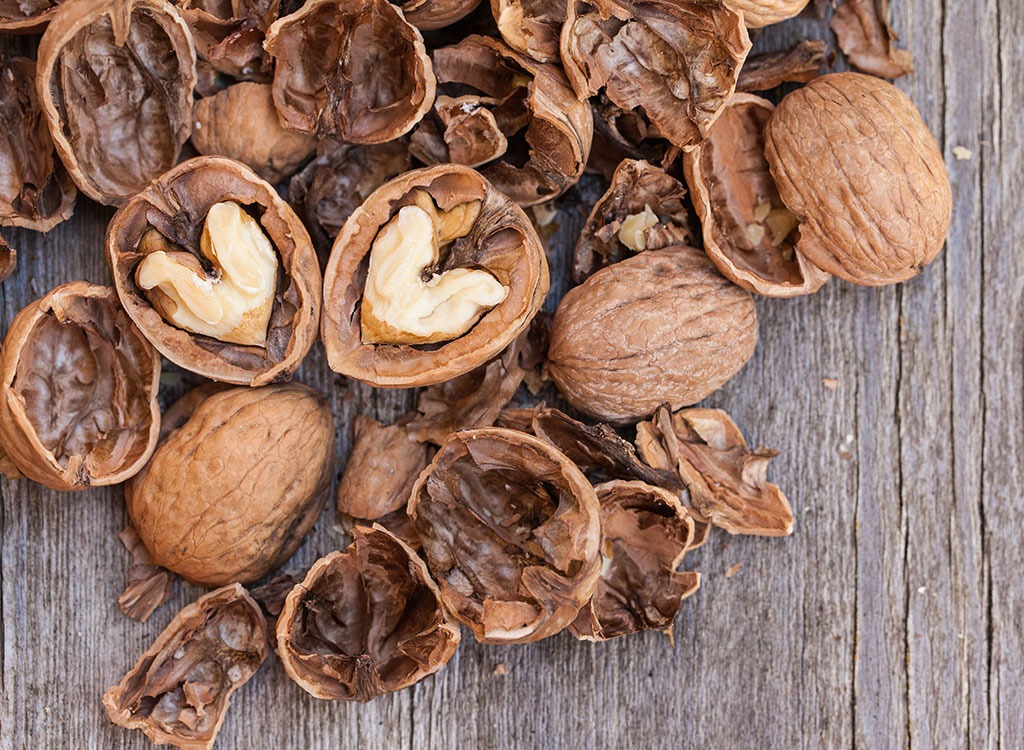
You probably already know that nuts are high in heart-healthy unsaturated fats, but when it comes to boosting your mood, you'll want to pay particularly close attention to walnuts. "In addition to healthy fats the magnesium and omega-3 fatty acids found in walnuts have both been shown to positively impact serotonin and dopamine levels (mood hormones)," says Tanya Zuckerbrot MS, RD, and the founder of the F-Factor Diet. "Balanced levels of serotonin and dopamine may help to prevent clinical depression." She goes on to explain that magnesium helps regulate cortisol levels and promote feelings of well-being. "Psychology Today referred to it as "The Original Chill Pill" because of the vast research of magnesium in the prevention and treatment of anxiety and depression. Intrigued? Find out more with these 19 Magnesium Tips You Didn't Know You Needed.
Saffron

Common in Persian cuisine, saffron is a spice that acts as a natural antidepressant. Research shows that saffron can be beneficial for people suffering from anxiety and depression. "A 2015 study assessed the efficacy of crocin, the main component of saffron, as a treatment for depression and found that it was more efficacious than placebo in the treatment of depression when given with an SSRI," says Zuckerbrot. "Saffron has also been shown to have a positive effect on sexual dysfunction and is an effective treatment for the sexual side effects from antidepressants in men."
Oatmeal
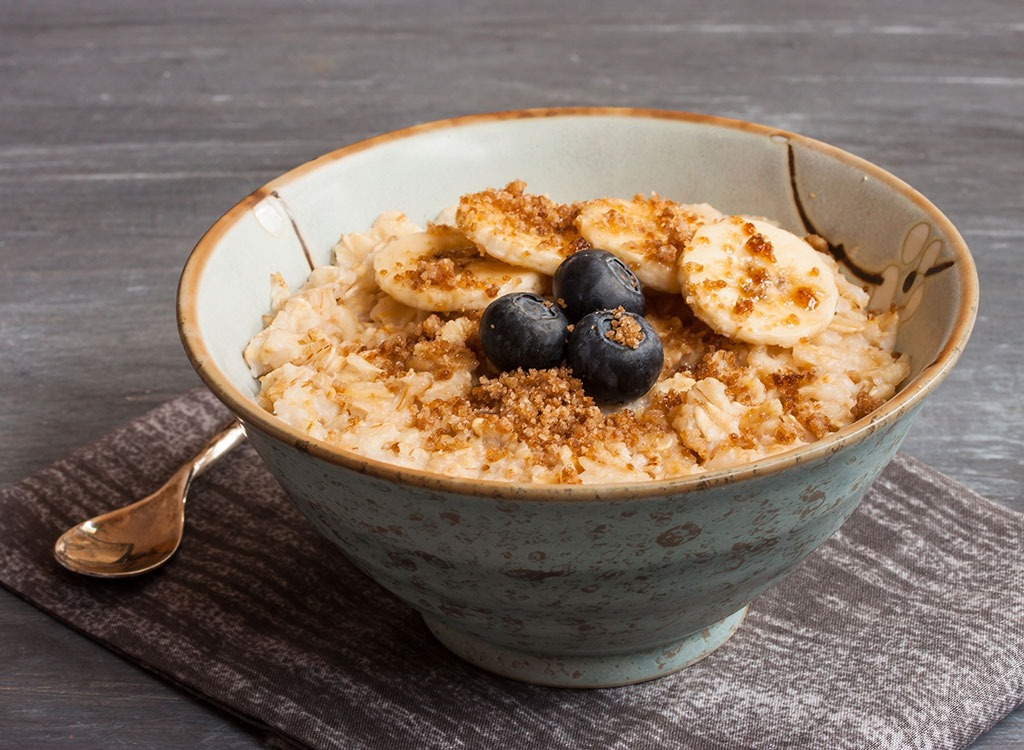
Oatmeal naturally changes your brain chemistry by creating your body's feel-good chemical, serotonin, the mood hormone we just mentioned. "It will kick serotonin into high gear and help combat pain, decrease appetite, and produce calm or sleep," say The Nutrition Twins, Lyssie Lakatos, RDN, CDN, CFT and Tammy Lakatos Shames, RDN, CDN, CFT and authors of The Nutrition Twins' Veggie Cure. Make the most of oats by also learning about overnight oats, one of the biggest food trends.
Bananas
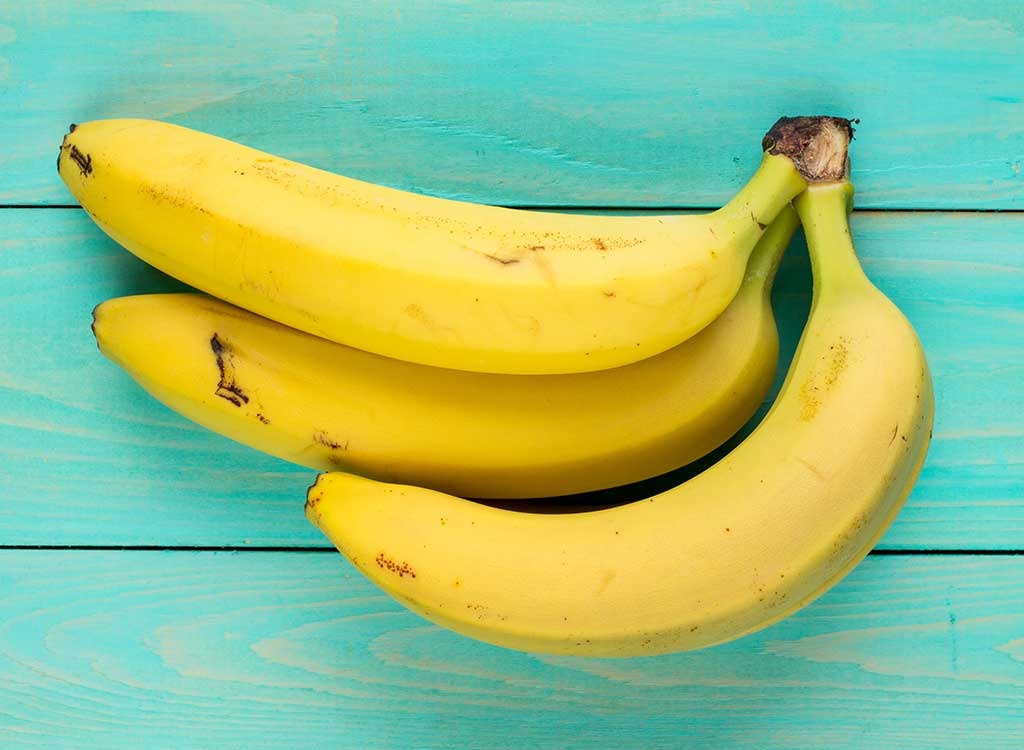
Cheap, compact, and easy to procure, bananas are one of the best pre-workout snacks. But its nutritional profile—even without the workout—lends itself to better moods. "Bananas are high in complex carbohydrates, which contain serotonin, the feel-good chemical," says Zuckerbrot. "Complex carbohydrates also improve the transport of tryptophan into the brain, where it is converted to serotonin." Zuckerbrot goes on to explain that bananas contain the amino acids tyrosine and phenylalanine. "Tyrosine leads to balanced levels of dopamine in the brain and aids in the reduction of body fat—and who doesn't love shedding some fat!?—while phenylalanine is used to form tyrosine." Bananas also contain vitamin B6, which helps convert tryptophan into serotonin.
Salmon
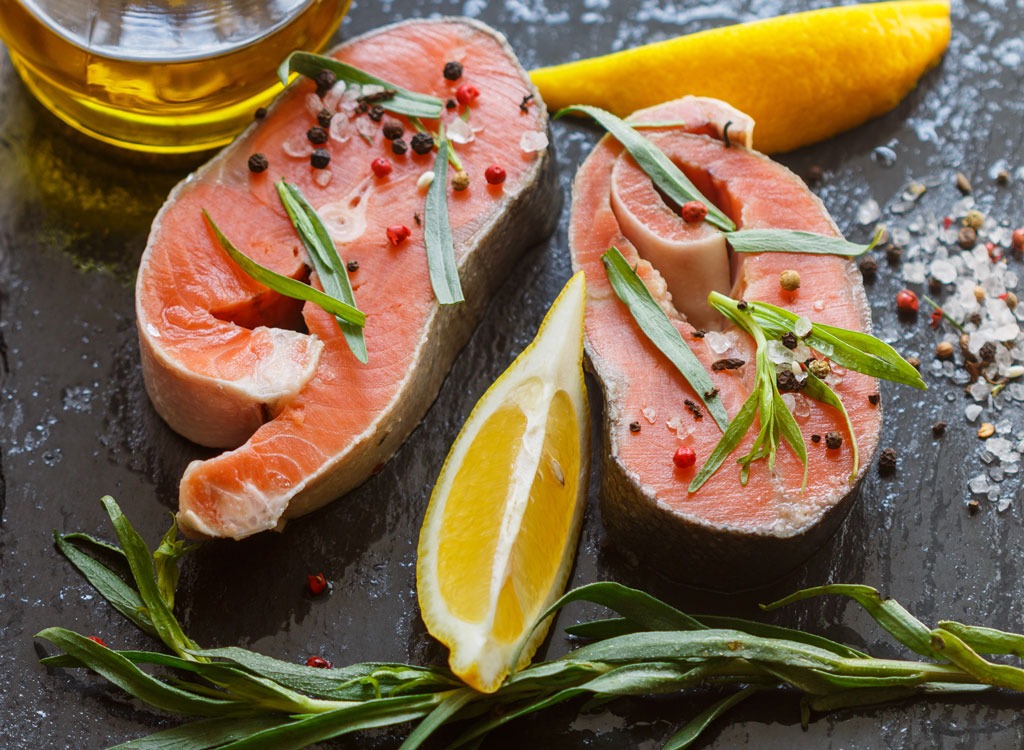
Like walnuts, salmon contains a healthy dose of omega-3 fatty acids, which are an important nutrient for the brain's composition and functioning. Zuckerbrot points to a number of studies that have shown that inadequate doses of omega-3 fatty acids can increase the risk for neuropsychiatric disorders, especially those concerned with mood, memory, and behavior. Salmon is also rich in tryptophan, which is the precursor to serotonin, the feel-good chemical. She suggests trying lox/smoked salmon in the morning to get a boost of omega-3s and protein, which will help keep you feeling full.
Potatoes
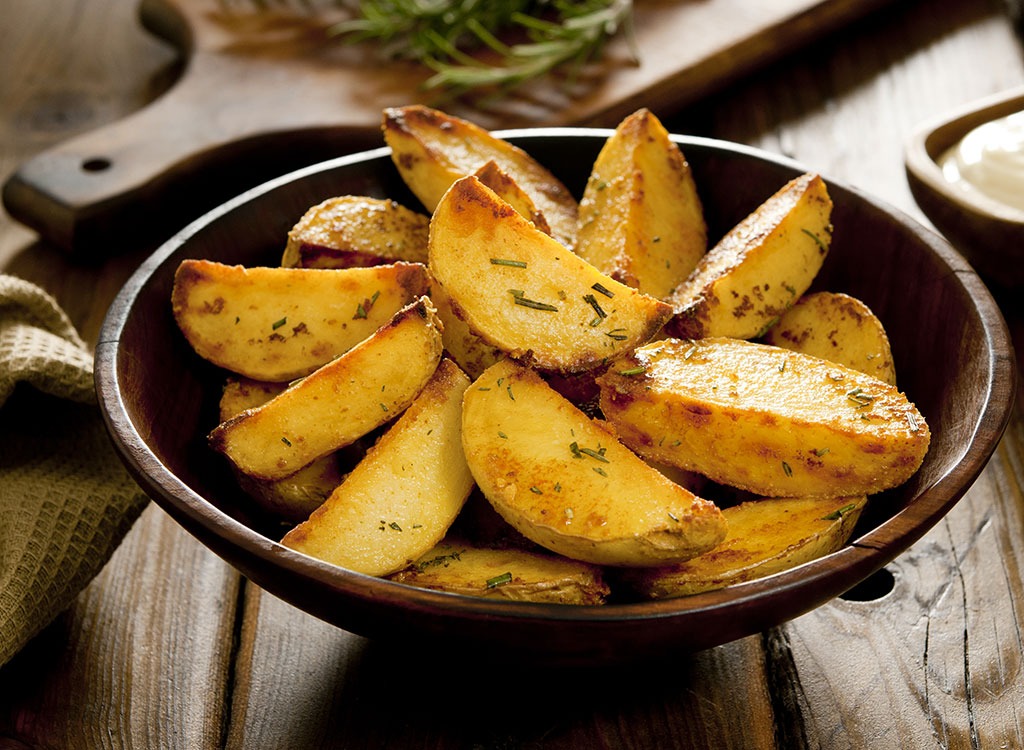
Potatoes are superstars when it comes to creating mood-boosting and anxiety-fighting serotonin. "They're also a good source of vitamin C, a vitamin that helps with serotonin production as well," say The Nutrition Twins. Bonus: you might not think of them when you're looking to get your fill, but potatoes can help ward off winter colds since one has 45 percent of the daily value of vitamin C.
Milk
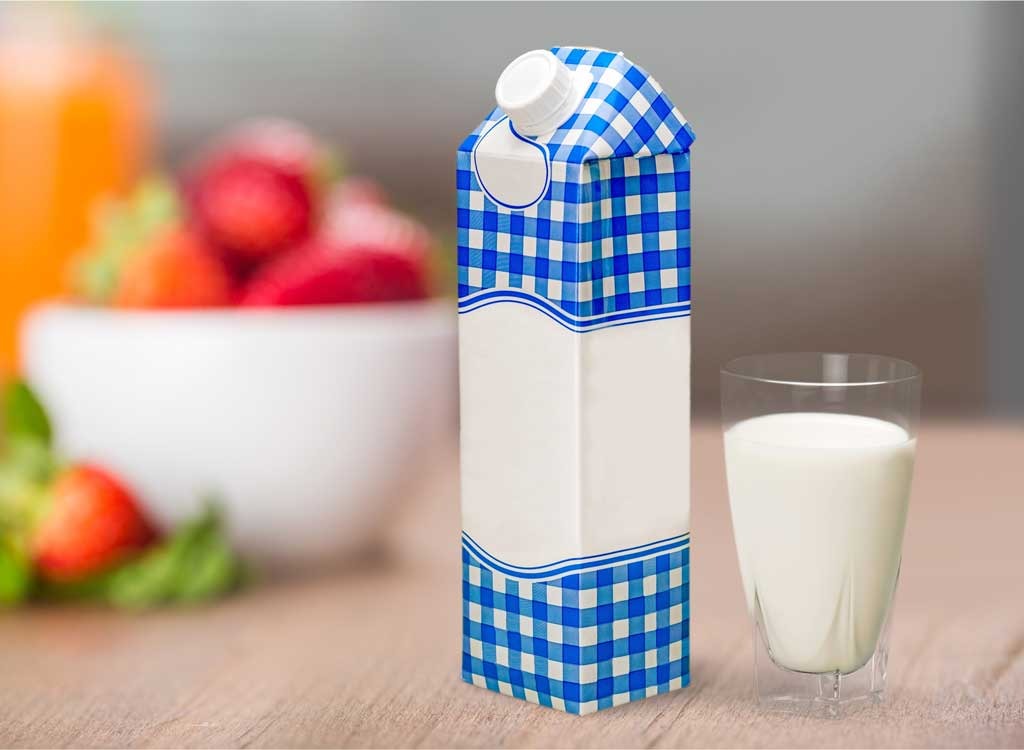
Research has shown that people who are low in vitamin D have higher rates of depression and anxiety. It can be difficult to get your vitamin D naturally from the sunlight, especially in the winter, which is why you should make an effort to get your fill via fortified foods or a supplement. The Nutrition Twins suggest working milk fortified with vitamin D into your diet. You can pour it onto your cereal, add it to your smoothies, or use it as a replacement for cream in your cooking.
Mushrooms
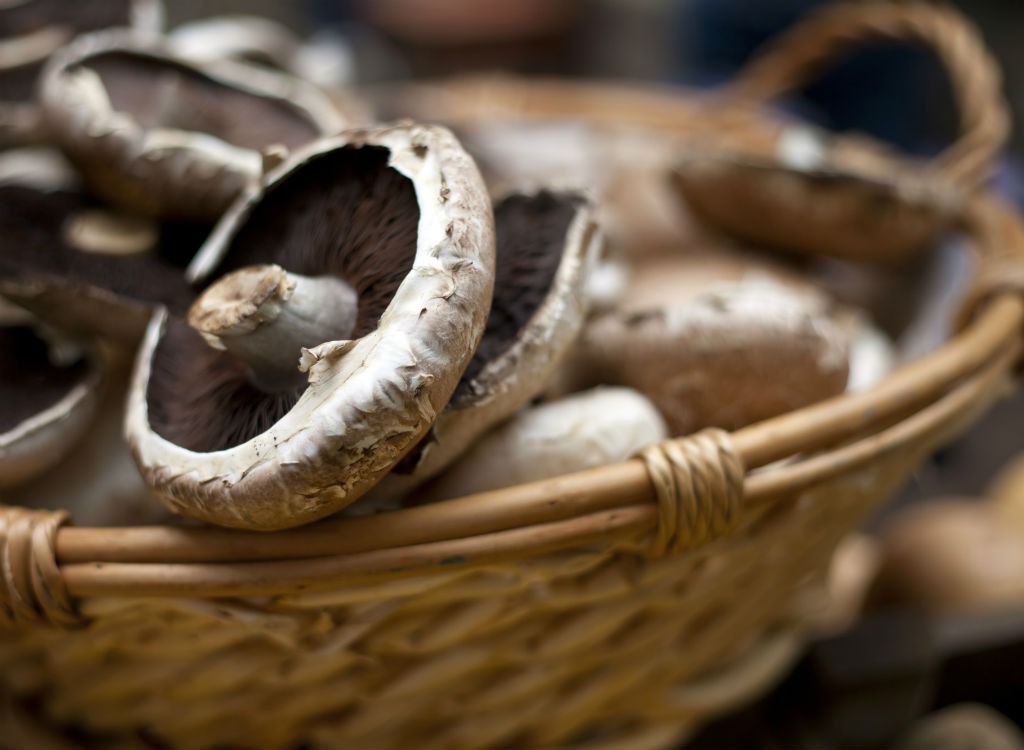
"Mushrooms are a great—and underrated—source of vitamin D to help fight depression and anxiety," say The Nutrition Twins. "In fact, they're the only vegetable to naturally contain vitamin D! Some of the light-exposed mushrooms can provide 100 percent of the daily value for vitamin D, so add them to your salads, your omelets, your soups, stir-fries, and casseroles." Speaking of soups, you'll love these 20 Best-Ever Fat Burning Soups!
Kale
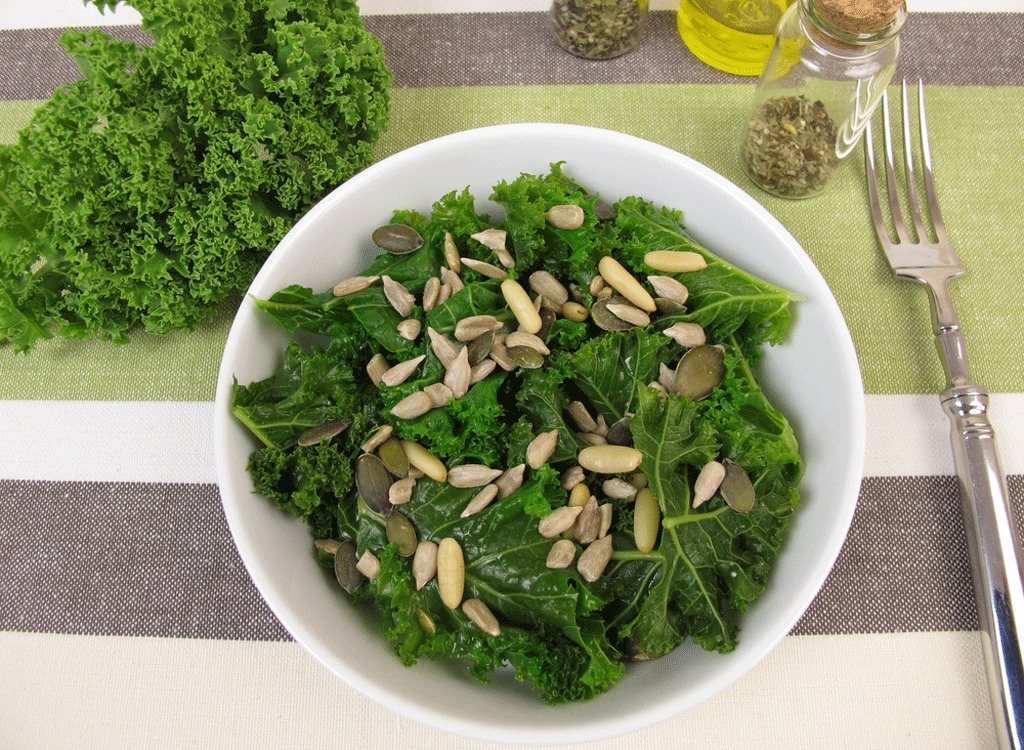
Kale is so readily available you really don't have an excuse not to treat your body to this nutrient dense, low-calorie leafy green. "Like walnuts, kale contains depression-fighting magnesium, but it also contains copper, a mineral involved in essential cellular function and overall well-being," says Zuckerbrot. "Copper stabilizes mood and can decrease the risk of neurodegenerative diseases like Alzheimer's when consumed adequately."
Spinach

Spinach and Swiss chard are also fantastic, nutrient-dense mood boosters. "Rich in magnesium, which helps to relieve tension and relax the muscles, we tell our clients to toss spinach in their salads and stack it in their sandwiches, wraps, and burritos," say the Nutrition Twins. "Add a spritz of lemon juice or another source of vitamin C and you'll boost iron absorption while you're at it."
Kiwi
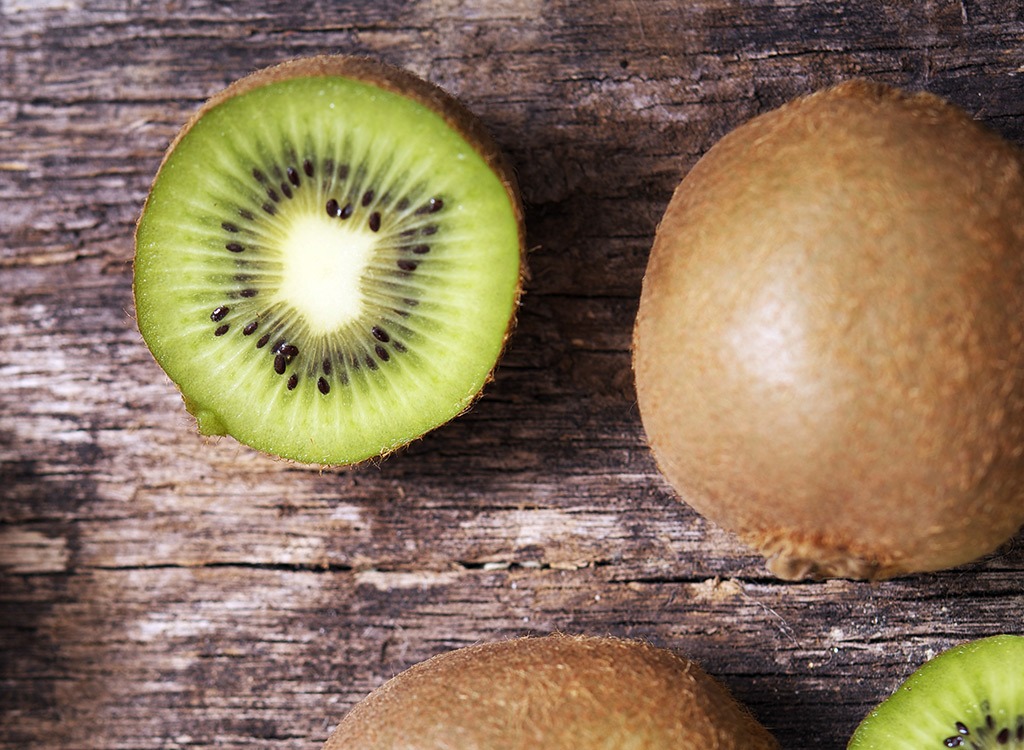
Folic acid deficiency has been found in people with depression and anxiety, which is why the Nutrition Twins recommend that people eat kiwis if they're feeling low. "Kiwis are also rich in vitamin C, which research has shown may help lower blood pressure and other physiological reactions to stressful situations."
Broccoli

Broccoli is high in B vitamins, which may help fight anxiety. "Research suggests people with low levels of these vitamins are more likely to have depression and anxiety than those with normal levels," say the Nutrition Twins. "Toss some in your pasta dishes, soups, and salads."
Green Tea
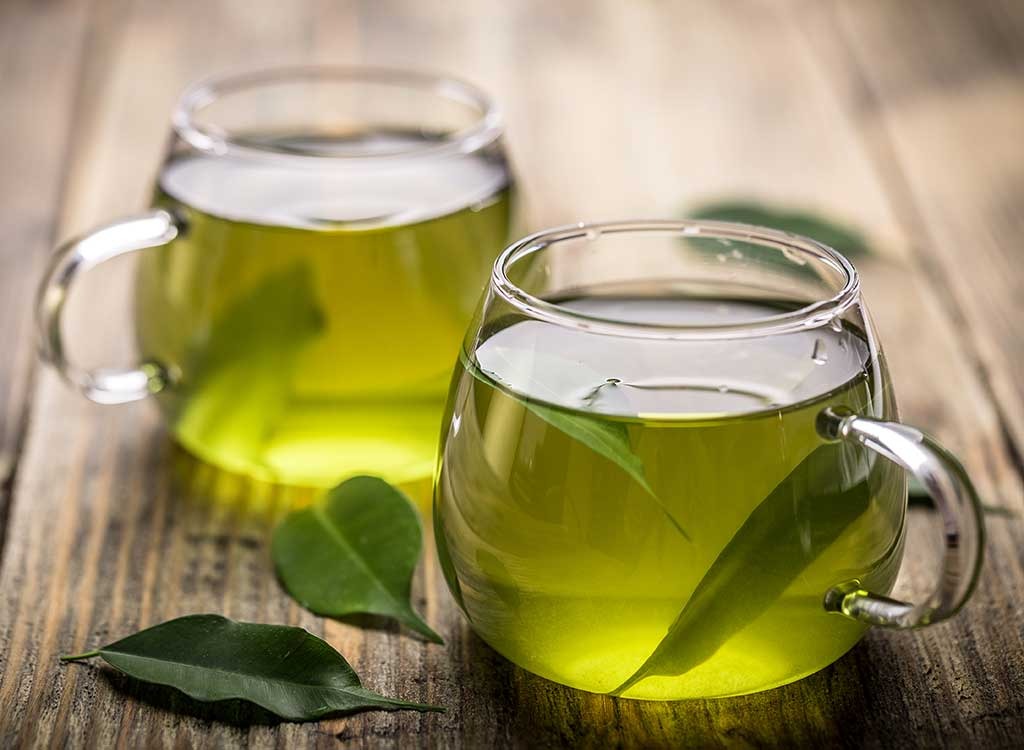
Green tea is not only rich in antioxidants, but research has shown that it's also rich in a depression-fighting amino acid called theanine. Opt for matcha, a powdered green tea, which has up to five times as much theanine as regular green tea.
Chocolate

Before you reach for more Hershey's Kisses, note that we're talking about pure (or near pure) cocoa. The more cocoa is processed, the fewer benefits it has. There isn't nearly enough cocoa in milk chocolate to get any mood-enhancing benefits. In fact, foods high in sugar, saturated fats, chemicals, and additives, like most chocolate bars, will likely leave you feeling worse because they lead to sugar spikes and crashes. Try adding some pure cacao powder to your smoothies or chia pudding or opt for organic chocolate bars that use the fewest ingredients possible and high percentages of cocoa (70 or higher) while maintaining an appealing flavor profile. Say goodbye to added sugars—and goodbye to your belly—with Zero Sugar Diet! Order your copy today!
Chia Seeds
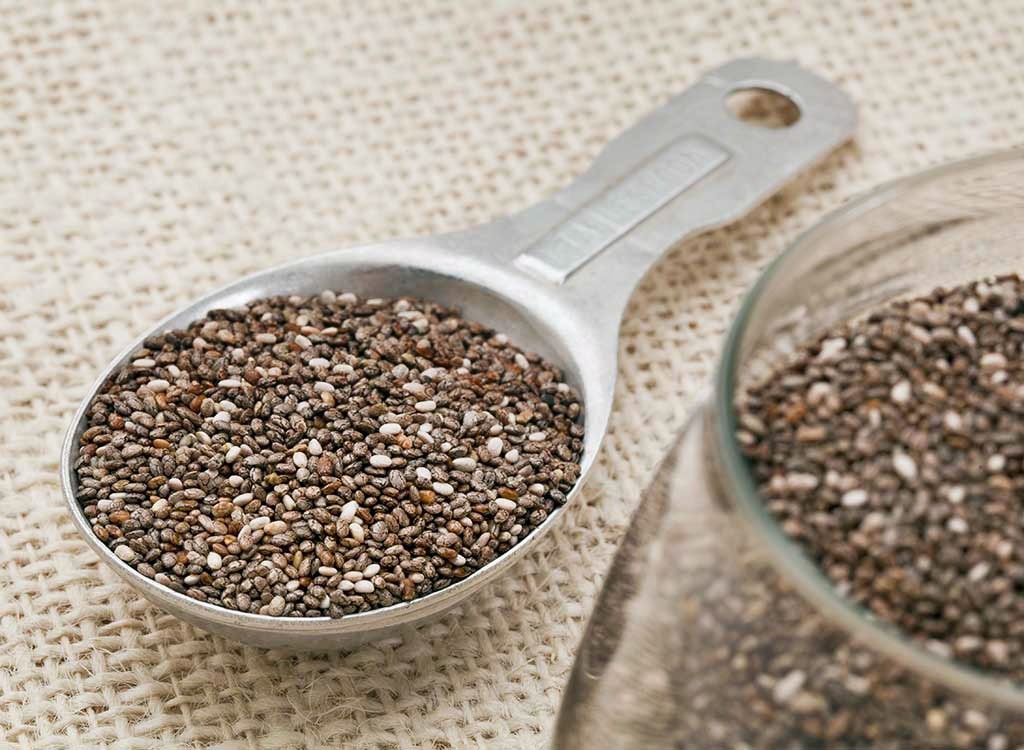
Tryptophan is an essential amino acid that helps boost your mood and promote restful sleep. The problem is that it isn't naturally produced by our bodies; you need to absorb it from whole food sources. A great source is chia seeds. Chia seeds also get brownie points for being high in fiber, meaning that even if you consume them in something sweet—like chia pudding—they will be slowly absorbed into the bloodstream, helping to prevent blood sugar crashes. Plus, the fiber keeps you full longer.
Avocados
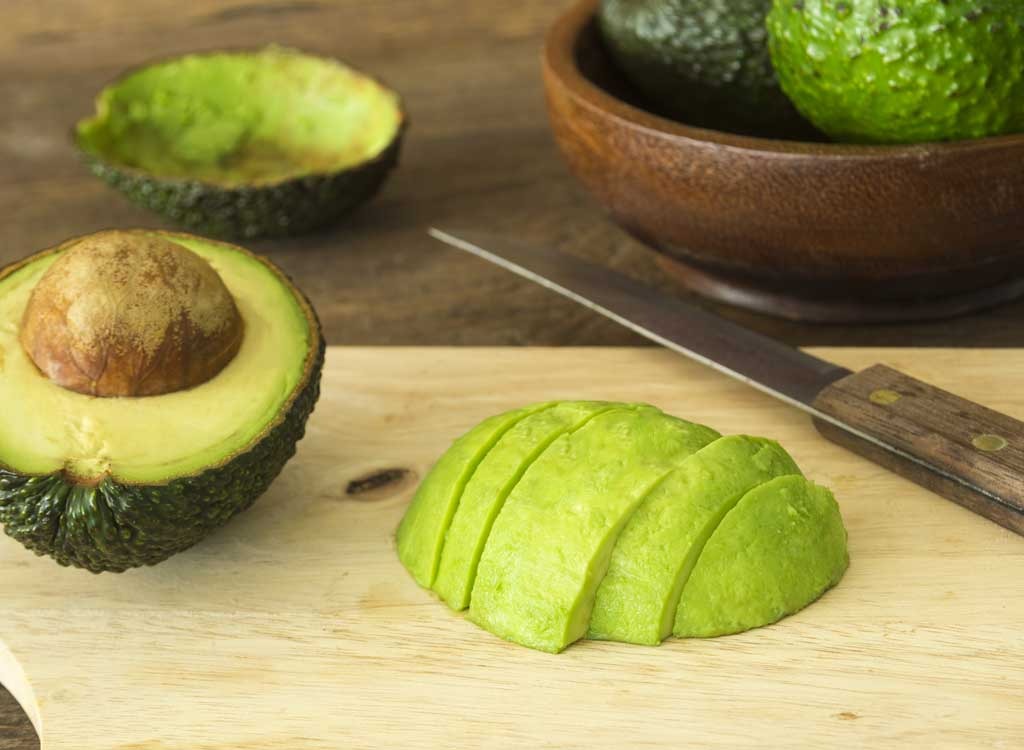
There's a reason avocado toast has become such a staple, and it's not just because it looks pretty on Instagram. Avocados are full of healthy fats that are not only good for your heart, but they help to absorb other nutrients in other foods you eat. Research has also shown that diets that are low in healthy fats are associated with stress, anxiety, and depression.
Blueberries
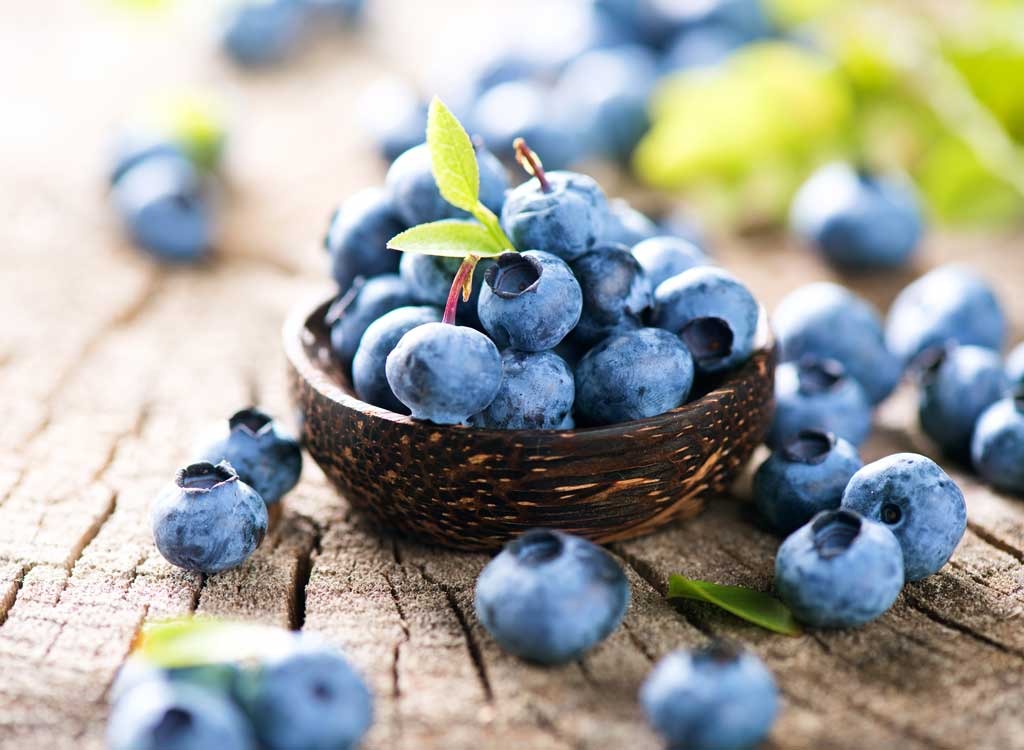
Folate is a vitamin that helps produce the mood-enhancing serotonin we discussed earlier. While it's present in all berries it's particularly high in blueberries. Blueberries also have anthocyanins (water-soluble pigments, these are the reason blueberries are blue), which help boost well-being. Anthocyanins have also been linked to decreased inflammation, which may also contribute to a decrease in depression. Again, all berries will have this effect, but it will be especially potent with blueberries. Stock up on these 30 Best Anti-Inflammatory Foods, too!
